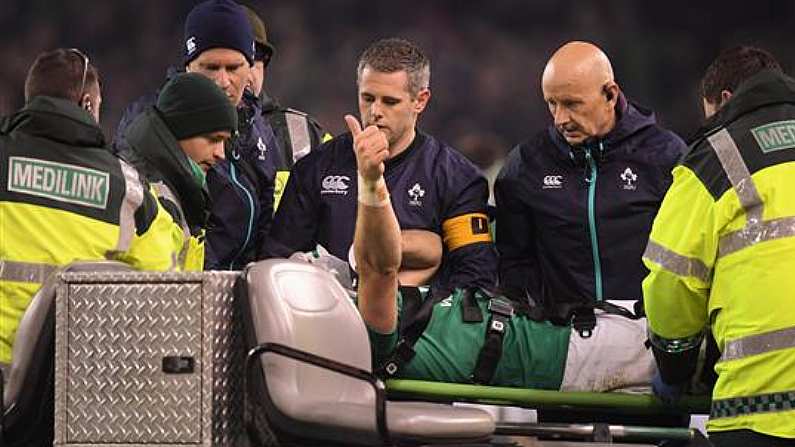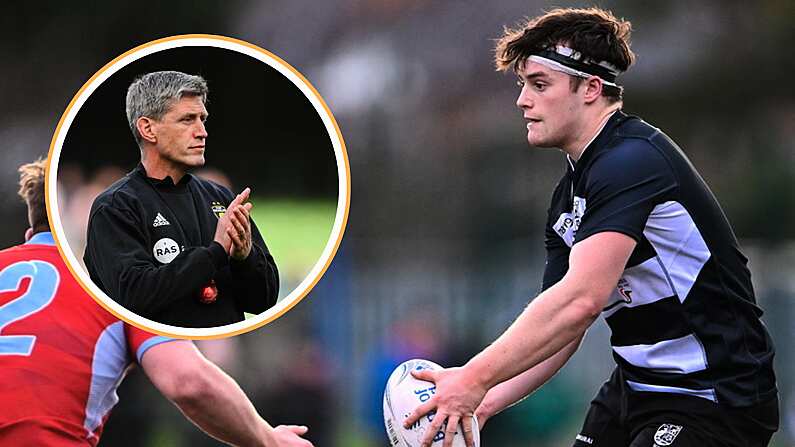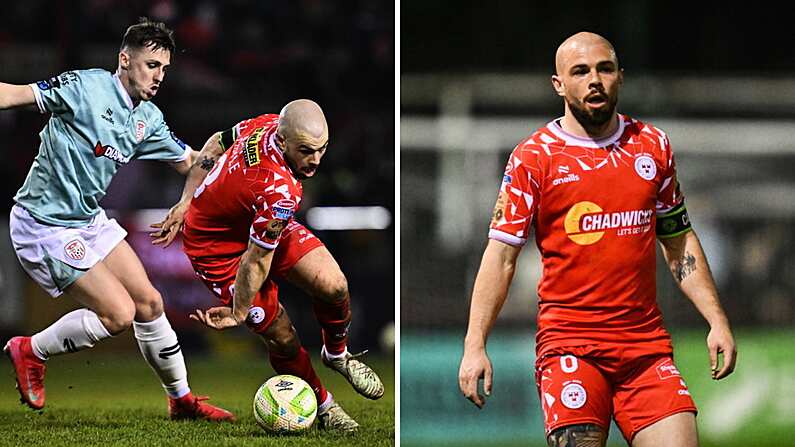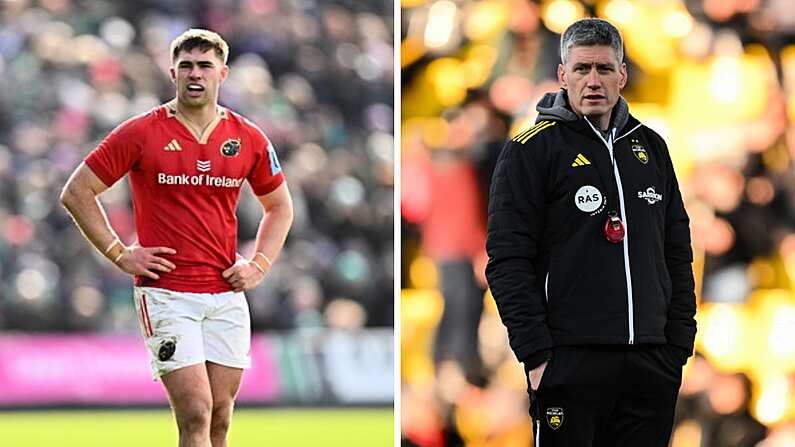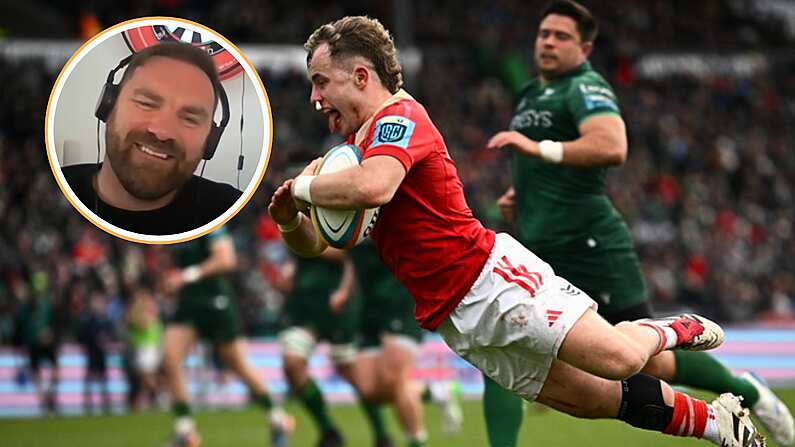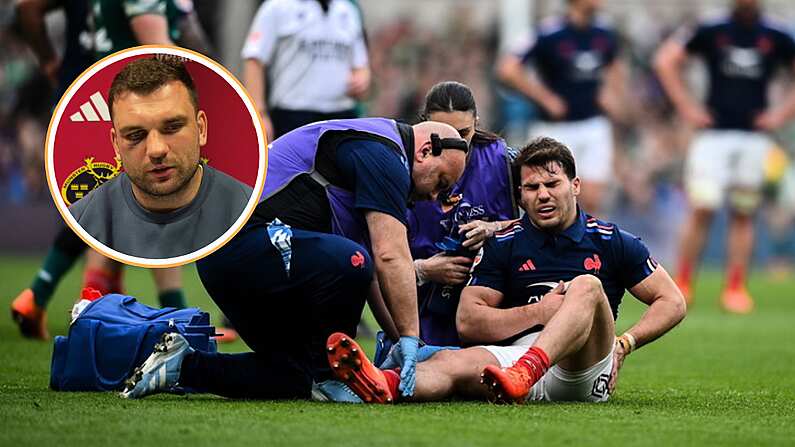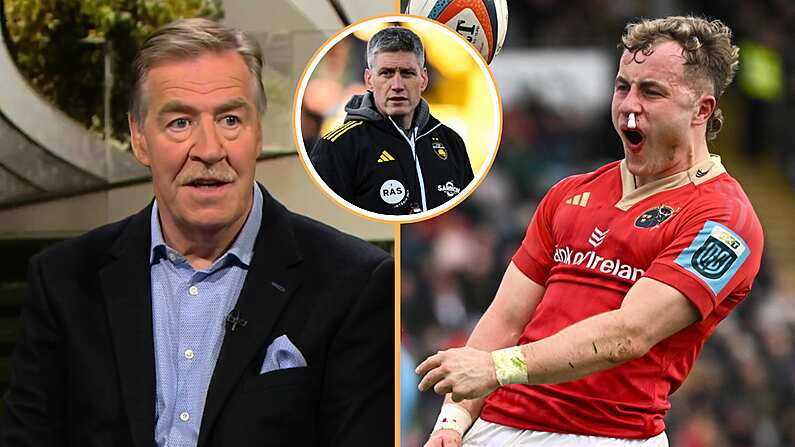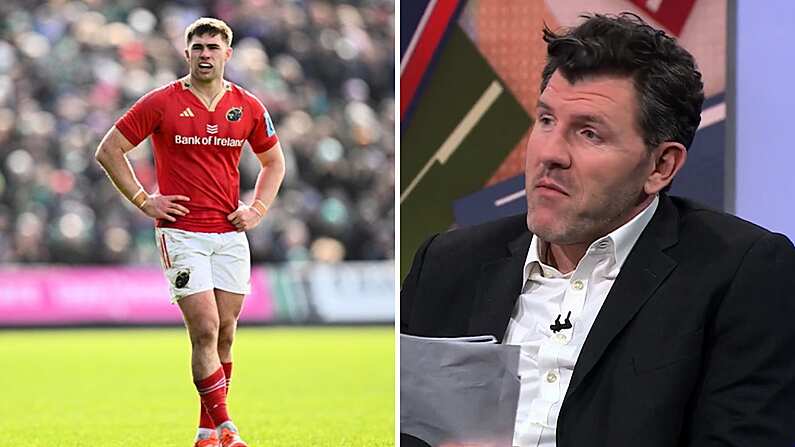South African rugby union referee Jaco Peyper was shortlisted for referee of the year in 2016, but we're presuming his performance reffing Ireland vs France in the 2016 Six Nations didn't make his personal highlight reel. Ireland vs France in Paris last February was a dirge of a match best remembered for French cheap shots. Remember Yohann Maestri's shoulder lunge on Johnny Sexton in the 14th minute.
Or the clothesline that knocked Dave Kearney out for a month.
After that game, Joe Schmidt was measured in his criticism of Peyper but you can sense his anger if you read between the lines.
“Those things are for the referee to look back at and I’d certainly encourage the referee organiser to look back at them.
“We had some very clear indications coming into the Six Nations about what would be tolerated and what wouldn’t be, and the sanctions that would follow. Again, that’s entirely outside my gambit. What Rory and I have got to try and work out how we best cope if those things are happening, how we stay focused on our process.
“It was tough, we lost Dave Kearney in one of those incidents and he’s got an AC injury that will keep him out for some time. There is a fair degree of frustration, but some of that reflects our frustration at ourselves at the opportunities we didn’t take.”
This week. Schmidt knew the All Blacklash was coming and an increased physicality would be a massive part of the response to Soldier Field. As journalist Cahir O'Kane pointed out, Schmidt's comments about Peyper during this week seemed pertinent in light of his refereeing performance this evening.
“Look, there are obviously some things from the French game that we were disappointed with and some of those are around the safety of players.
“I don’t think it’s something that the All Blacks are going to suddenly deliver, I think they are going to look to deliver a really quality performance that’s disciplined as well. It’s a new day for the referee just like it’s a new day for the two teams. Jaco was nominated as one of the top referees and we’ve got confidence that he will deliver a top performance as well.
There was a streak of weakness about Peyper's performance this evening, as he often submitted to the TMO's will when he seemed to think otherwise. But there was a bigger problem. This game seemed patently dangerous to play in. Refereeing could have changed that. Cane's hit on Henshaw was probably only a penalty by the letter of the law, but when players are left concussed and have to be stretchered off while taking oxygen for similar 'penalties', surely the game has a fundamental problem.
Looks like #AllBlacks finally got their man in Henshaw. 2 weeks ago Moody tipped him, Cane finally got him!! #disgrace #shouldertoshoulder
— Jonny McFadden (@jonnymcfadden) November 19, 2016
Schmidt's reaction said it all.
Then in the second half, Fekitoa was sent to the bin for the following clothesline on Zebo, which felt eerily similar to the tackle that knocked Dave Kearney out of the France game in February. A yellow card seemed like the conservative move.
Fekitoa goes in the bin for a high tackle on Zebo. https://t.co/nMJpcNgAEX
— RTÉ Rugby (@RTErugby) November 19, 2016
In fact, throughout that bruising third quarter, when Ireland poured forward for the try that could change the game, New Zealand uncorked high tackle after high tackle. They were playing with the rope that Peyper was allowing them. There is a line about the Seattle Seahawks vaunted Legion of Boom secondary: they rarely get called for defense passing interference because they commit it on every play. They know the refs cannot call DPI on every play so they play the whole game over the line. Tonight the All Blacks finished with 14 penalties and two yellow cards. In Soldier Field, they had 12 penalties. During that most punishing phase of the game, every other All Blacks tackle seemed high and dangerous.
Rory Best on high tackles: "I'm a parent myself and I don't want to see people going off on a stretcher."
— Gavin Cummiskey (@Cumoski) November 19, 2016
This is not to say Peyper cost Ireland the game - Ireland repeatedly failed to execute at the most critical moments - but there's a bigger point about player safety here. World Rugby is apparently committed to reducing dirty play and even issued a statement last week imploring referees to crack down on high tackles.
The laws of the game clearly state that the necks and heads of players are sacrosanct. When it comes to foul play, the game is cleaner now than ever before but referees must constantly be alert to head-high hits.
"By taking this strong approach, we are saying to players that tackling an opponent above the shoulder line will not go unpunished."
But Paris was on Schmidt's mind when he was interviewed by RTE after the game about 'some of the really tough and nasty stuff out there at times'.
"Look. It's one of the things that's been really targeted in the game. I think it's the second time in this calendar year that we've had those same frustrations there. But we don't control that. We just had to forge ahead with who we had left once those guys had been knocked around and that's the best we could do. "
Paul O'Connell praised the All Blacks' cynicism at halftime as a mark of respect, and that's fair enough. Cynicism is a part of all sport and it's a streak you find in most champions. But in rugby, where cynicism can so often lead to serious injury, there is a high threshold on referees to ensure player welfare. Ireland have played 160 minutes this year with Peyper as ref. There are a lot of bruised bodies on the Ireland side tonight and they won't be looking forward to the next time they see Jaco Peyper and his whistle.


